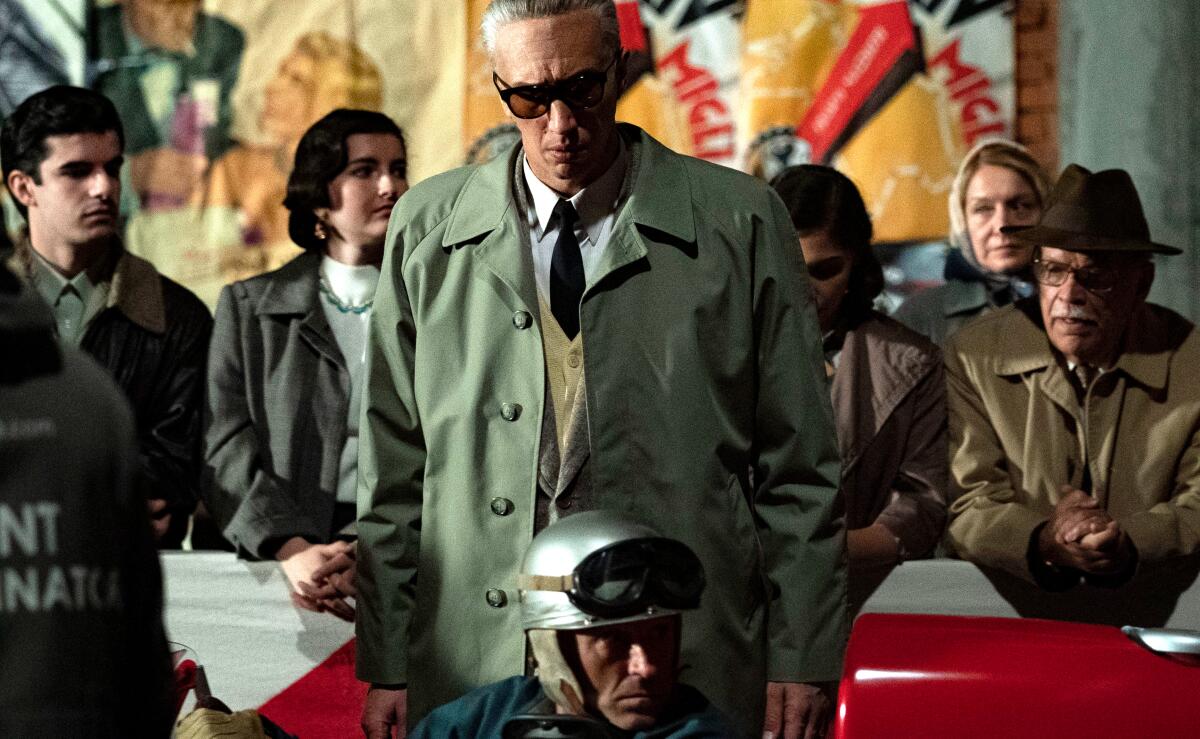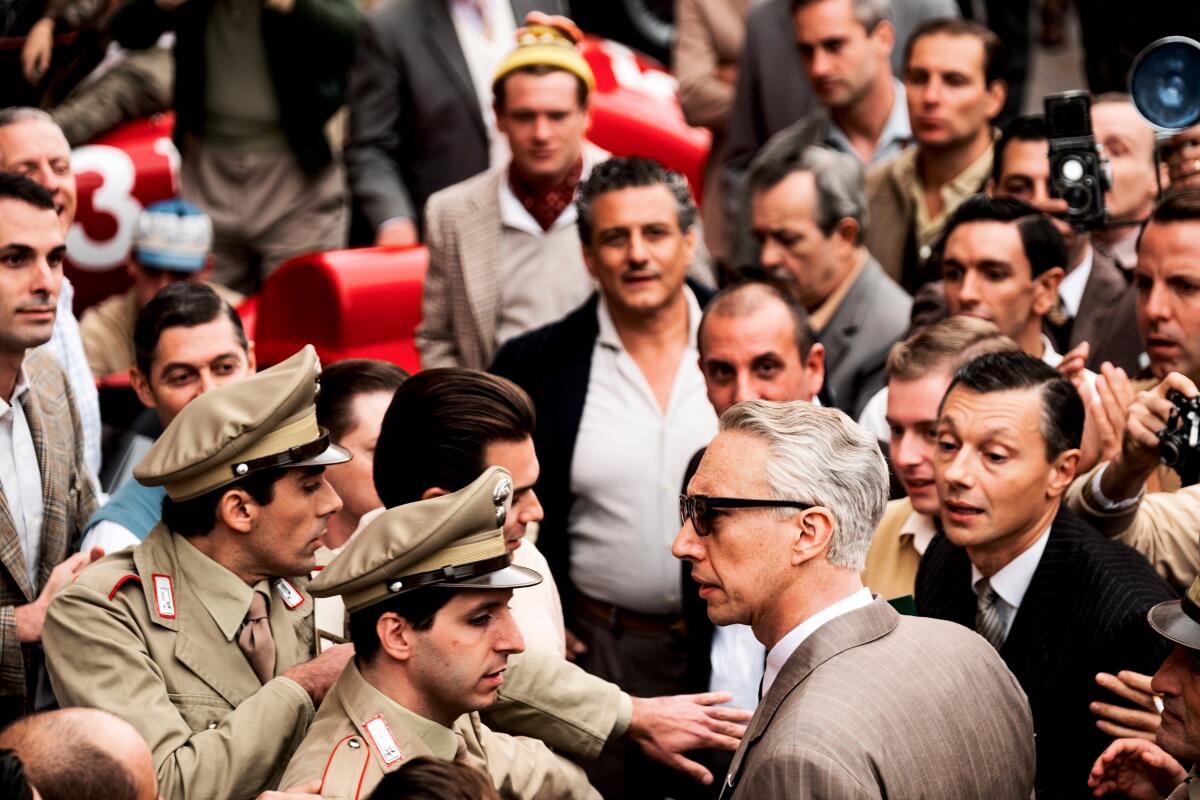Review: Michael Mann’s ‘Ferrari,’ with a terrific Adam Driver, is a somber epic of doom and vroom

- Share via
Amid the roaring motors and screeching tires of “Ferrari,” Michael Mann’s operatic saga of fast cars, furious women and the powerful human citadel who toyed with them all, a moment occasionally rises from the smoke with the grace and clarity of an aria. There’s one such scene early on, when Enzo Ferrari (Adam Driver), poring over his blueprints, explains to his young son, Piero (Giuseppe Festinese), how an engine works, how the continual movement of fuel and air through a system produces combustion. It’s a lesson in science, but also aesthetics: The more effective engine design, Piero astutely notes, is also the more elegant-looking one. “When a thing works better,” his father concurs, “usually, it is more beautiful to the eye.”
Ferrari’s words sound like a declaration of principles for Mann, a filmmaker who has long been taken with the beauty of how things work. In recent years, that preoccupation has driven him toward ever more dazzling heights of visual showmanship and formal abstraction: Think of “Public Enemies” (2009), with its strikingly digitized, deromanticized vision of 1930s gangsterdom, or the under-appreciated cyberthriller “Blackhat” (2015), which turned a computer’s gleaming innards into pure techno-poetry. Some of Mann’s critics would accuse him of stretching the image to indulgent, untenable extremes, of allowing form to dictate and even overpower function. His partisans, who are legion, would celebrate him for the same reason.
All of which makes the sleek visual restraint of “Ferrari,” the director’s long-gestating 12th feature, an especially fascinating thing to contemplate. Working with cinematographer Erik Messerschmidt (an Oscar winner for “Mank”), Mann has composed an epic of bright racetrack sunshine and inky shadows, where long, meditative silences give way to feverish jolts of vehicular action. The storytelling has an unfussy classical burnish that feels nicely scaled to its time and place. Although drawn from Brock Yates’ 1991 biography, “Enzo Ferrari: The Man, the Cars, the Races, the Machine,” Troy Kennedy Martin’s script sticks to a three-month crisis point in 1957 — one of those carefully chosen narrative vantages from which a biopic can survey the glories of the past and brood over the uncertainties of the future.

We catch a snippet of the past at the beginning: a flurry of black-and-white 1920s racing footage, with a younger version of Driver’s Enzo grinning behind the wheel. Thirty years later, he has gone from carefree racer to world-weary Italian icon, famed for building automobiles whose power, speed and, yes, beauty are nonpareil. But the competition from Maserati and others is getting tougher, and if Enzo remains a national treasure, he’s a tarnished one at best. The Ferrari auto factory, which he founded in 1947 in Modena with his wife, Laura (a ferociously good Penélope Cruz), is in danger of closing unless it ramps up production and sales, which will happen only with the help of an outside investor like Ford or Fiat. It’s a grim prospect for a company that Enzo and Laura had hoped would one day be run by their son, Dino, who recently died at age 24 from muscular dystrophy.
“Ferrari” is about the agony of grief, the threat of compromise and, most of all, the sting of betrayal. While Laura is bitterly aware of her husband’s frequent philandering, she doesn’t yet know about his longtime mistress, Lina (a likable but miscast Shailene Woodley), or the fact that they have a son, Piero. The closely entwined fates of the Ferrari brand and Enzo’s secret heir — both conceived about a decade earlier amid the still-smoldering ashes of World War II — set the movie onto two narrative tracks that are destined to converge. One clock starts ticking early on, counting down the days until five of Ferrari’s drivers compete in the Mille Miglia, a famously harrowing open-road race whose outcome could determine the factory’s fate. The other clock is Laura herself: Played by Cruz with a controlled but combustible fury, she has half the company in her pocket and a keen nose for her husband’s duplicity.
The setup is a classically Mann work-and-family construct, and much of it is distilled into that earlier scene with Enzo, Piero and the blueprints. Here, far removed from the clamor and frenzy of the racetrack, a man shows his son the ropes while the boy’s mother looks lovingly on from the sidelines. In these moments, it’s hard not to flash back on other Mann thrillers (especially “Thief” and “Heat”), with their close-up scrutiny of men at work and their pointed juxtaposition of personal and professional spaces. It’s also hard not to contrast this sweet domestic idyll, bathed in sunlight and backed by Daniel Pemberton’s moving score, with the impenetrable walls of darkness at Enzo and Laura’s house in Modena, where their once-happy marriage hangs by a slender if surprisingly resilient thread.

Enzo’s love for his second family is genuinely touching, as is the unwavering respect he maintains for Laura and her business acumen, even if their love has cooled (though not necessarily their sexual passion — it’s complicated). The tenderness flickering in Driver’s eyes is one of several grace notes in a performance that, being delivered entirely in Italian-accented English, could have been forgiven for having no grace notes at all. But as in the recent “House of Gucci,” another epic portrait of an Italian dynasty on the brink, Driver doesn’t hang his performance on a speech pattern; he finds subtlety, humanity and, crucially, room to maneuver emotionally. (It doesn’t hurt that he rocks the salt-and-pepper look, looking remarkably convincing as a man nearly two decades his senior.)
What pulls you into Driver’s performance — and makes “Ferrari” feel surprisingly expansive, despite its narrow time frame — is the way it suggests the character’s own ability to compartmentalize. A man this powerful contains multitudes: There’s Enzo the shrewd media manipulator, expertly jousting with reporters and arranging strategic favors as the Mille Miglia approaches. There’s Enzo the seasoned wrangler of egos, shuffling and reshuffling his talented drivers (well played by actors like Patrick Dempsey, Jack O’Connell and Gabriel Leone) in a nimble game of musical cars. And finally, there’s Enzo the ruthless competitor and downplayer of death, who urges those drivers to throw caution in the wind and barely bats an eye when one of them is killed during a test drive.
The director and stars Adam Driver and Penélope Cruz discuss the making of the Italian-shot biopic that revs this year’s Oscar season into the red.
That grisly scene, in which the driver is hurled through the air like a jumpsuited rag doll, is an early harbinger of still more devastation to come. Mann neither skimps on visceral excitement nor soft-pedals the horror, which makes Enzo’s indifference seem all the more maddening. Walling himself off from guilt or blame, you realize, is the only way he can do his job. His company is not just a builder of cars but also a purveyor of thrills, a breaker of records, a conqueror of the public imagination. Enzo is just a man at work, in other words, and he can’t be blamed for the sacrifices that his work requires — or can he? I think Mann, in his own reserved, cool-toned way, makes us entirely aware of his subject’s moral compromises, notably when the movie lingers on a scene of a very different family that will be engulfed in tragedy as the Mille Miglia draws to its fateful close.
In one of the movie’s most lyrical and resonant sequences, Enzo and several other characters (including his mother, played by the commanding Daniela Piperno) attend an opera that stirs their own individual reminiscences of happier times with the people they loved. Family matters enormously in Mann’s world, but family happiness is not something promised to anyone; the only certainties are the immersion of work, the fickleness of love and the terrifying randomness of death.
Enzo Ferrari was a vehicular pioneer, a man who pushed his cars, his craft and technology relentlessly forward. The somber achievement of “Ferrari” is to glance in the opposite direction, and to show us everything that even this genius of speed and momentum could not outrun.
‘Ferrari’
Rating: R, for some violent content/graphic images, sexual content and language
Running time: 2 hours, 11 minutes
Playing: Starts Dec. 25 in wide release
More to Read
Only good movies
Get the Indie Focus newsletter, Mark Olsen's weekly guide to the world of cinema.
You may occasionally receive promotional content from the Los Angeles Times.












